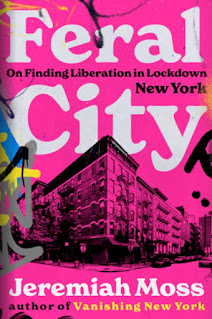The reviews have been mixed--it barely rates "fresh" on the tomatometer. Slate called it "unremittingly bleak, making for one of the most depressing nondocumentary films you're likely to see, well, ever." Anthony Lane in The New Yorker says, "There has long been a strain of sorry lassitude in Kaufman’s work, and here it sickens into the morbid." They just don't get it.

In the film, a director attempts to recreate New York City in a vast warehouse. He tries to capture what might be a Buddhist idea that the present moment is infinite. Arguments, cups of coffee, peeling wallpaper, sadness--all the human drama of the everyday in which nothing and everything happens.
Of course it cannot be done. You cannot hold it all--it deepens and multiplies too quickly. In Charlie Kaufman's world, the self is a multiplicity--a room full of Malkoviches, a twinned Kaufman, the ghosts of remembered selves in a mind not spotless yet eternal. In Synecdoche, the selves keep replicating through actors who play actors who play the originals.
The movie is a (apocryphal?) Cream of Wheat box, a mise en abyme in which we glimpse infinity. (See Droste effect.)
I learned the word synecdoche in a high-school English class and it still means to me what it meant then: A part that represents the whole. Kaufman, like any artist, can only grasp a part of the whole because the whole can never be grasped. The entire movie is an admission of this failure.
As Kaufman uneasily told the Times, “Not only is Caden’s play a synecdoche, but so is every work of art. There is no way to convey the totality of something, so every artistic creation is at most a representation of an aspect of the thing being explored... As for the part about this project mirroring Caden’s, I can certainly see the obvious parallels, but I am not Caden. Perhaps he represents part of me and in that sense, he is a synecdoche of me.”
In the Atlantic, psychologist Paul Bloom looks at multiplicity.
For an artist to admit and expose his limitations as he yet struggles to create, and to put his creation before the public, is a courageous act. Synecdoche is not depressing, nor is it bleak. To write it off in such a way perhaps reveals a shallowness of receptivity, an unwillingness to feel the full breadth of human emotion.
The film's creator painfully knows from the outset that he must fail, and yet he creates anyway. What could be more hopeful, more optimistic, and more successful than such an endeavor?
If you hurry, you can still see it at the Sunshine.




9 comments:
that is very strange how every head is exactly the same!
I loved the movie, but I did think it was depressing. The depressing part was how he used his art as a way of distancing himself from the everything that was going on around him. He only experienced things analytically for so much of the movie, and he only realized it at the end of his life. Like he was creating something that he would be able to savor as a whole later, when in fact there is no whole, only the parts.
Still, worth doing and seeing.Imagine telling someone not to speak until they get it right...That's why (or one of the reasons why)I don't trust la critique.
It was a real downer but definitely worth seeing again. One of the things I really liked about it was how it explored how life can be horrible and funny sometimes in the very same moment. And the performances were uniformly excellent. For further reading, here's an interview we did with Charlie Kaufman on Gothamist.
thanks for that gothamist link. it's funny how people connect "depressing" with "to be avoided." i don't romanticize clinical depression, but i do think it's beneficial to be connected to the so-called darker emotions and to works of art that help us to do so.
This is a provocative and brave film, and it should be supported because there are too few writers/directors like Charlie Kaufman working. I've defended this movie, and I gotta tell you, the hate that comes at this thing is crazy. It's like it's a personal affront. I dunno know...You could have a thousand Benjy Button's, I'll take Kaufman.
what amazed and inspired me is how kaufman just seems to do whatever he wants with his writing. a woman living in an eternally burning house? why not? brave indeed.
first anon here. agreed, a good melancholy kind of depression in synecdoche. though, I think that ben button has a similar pervasive sadness. button is about the experience of a man who is never in synch with his time and is always conscious of it. even in his happiest days, he soon becomes completely aware of how fleeting it is. if you can get over some of the cheesier aspects of the movie, of which there are many, it's actually a really interesting meditation life as a series of moments that either completely consume or that you experience, painfully, as an outsider.
I completely agree with all of the positive posts about the film, but in addition, I want to add that before seeing the ending, the movie seemed perilous. It took a long while to display what Kaufman wanted to display - life and (most of) all of its parts. The last few minutes bring it together so powerfully that I flat-out broke down. Whoever it was that mentioned the film as "a meditation on life as a series of moments that either completely consume or are experienced, painfully, as an outsider," said it very well.
Post a Comment